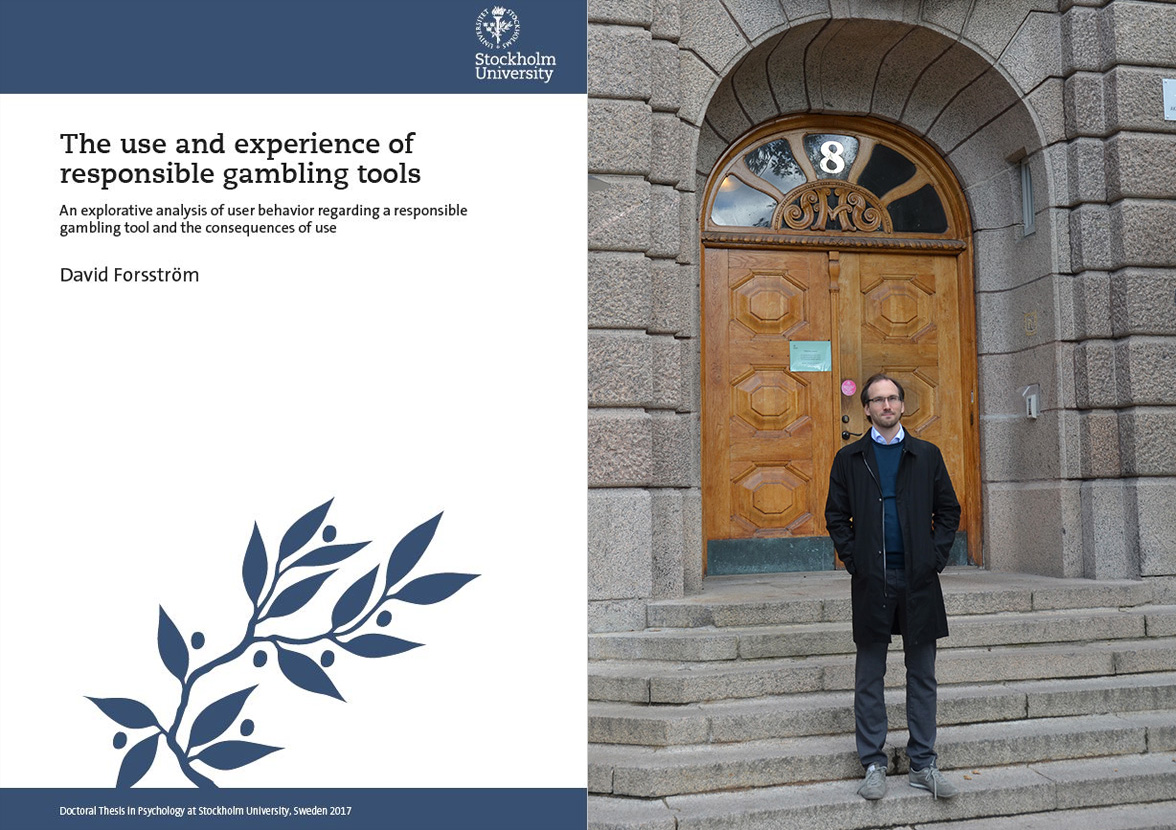Today at 10 PhD-student David Forsström will defend his thesis entitled “The use and experience of responsible gambling tools: An explorative analysis of user behavior regarding a responsible gambling tool and the consequences of use”. I have been the main supervisor and Hugo Hesser and Markus Jansson-Fröjmark were co-supervisos. The opponent was Professor Anders Håkansson from Lund University.
The following were part of the examination committee: Associate professor Rune Mentzoni (Bergen University), Professor Claudia Fahlke (University oif Gothenburg), Associate professor Jessica Storbjörk (SoRAD, Stockholm University) and Associate professor Björn Philips (Stockholm University).
[lightbox link=”http://www.carlbring.se/wp/wp-content/uploads/2017/12/DavidForsström_disputation-22.jpg” thumb=”http://www.carlbring.se/wp/wp-content/uploads/2017/12/DavidForsström_disputation-22.jpg” width=”800″ align=”center” title=”” frame=”true” icon=”image” caption=”Professor Per Carlbring (supervisor), Professor Claudia Fahlke (examination committee), Doctor David Forsström (just received his PhD), Professor Anders C Håkansson (opponent), Associate Professor Rune Mentzoni (examination committee), Associate Professor Jessica Storbjörk (examination committee) och Associate Professor Björn Philips (examination committee). Photo by Jonas Rafi.”]
The PhD-position was funded by Svenska spel.
This is how David summarizes the thesis:
Responsible gambling tools are an intervention that is designed to decrease gambling among individuals with an at-risk gambling behavior. Studies have indicated that responsible gambling tools can decrease gambling behavior, but little is known about how this intervention is used by gamblers. The aim of the present thesis was to explore different facets of the use, experience and functions of these tools. Study I used descriptive statistics and latent class analysis (LCA) combined with multinomial regression to explore the use of the responsible gambling tool Playscan among 9528 gamblers (regular and at-risk gamblers). The participants had volunteered to use the tool. The functions of the tool had a high rate of initial use but a low rate of repeated use. The LCA identified five user classes. Two of the classes (self-testers and multifunctional users) were defined as high users of the tool and had a higher risk of developing gambling problems according to multinomial regression. The multifunctional users were characterized by an extensive use of all the functions while the other high usage class had an extensive use of the self-test. The three other classes were as follows: those who did not use the tool, those who visited the tool but did not engage in any of the functions, and those who only used the tool’s advice on how to decrease their gambling. Participants’ reasons for use and non-use of the tool were attributed to their degree of need of the tool and its functions. The tool’s most widely used function was the self-test that investigated the level of negative consequences faced by a user due to his or her gambling. Study II was a qualitative study investigating participants’ views, experiences and their reasons for using the tool. The study was conducted by interviewing 20 volunteer users of the tool. These semi-structured interviews were analyzed by thematic analysis. The results showed that the users had a positive attitude towards the tool and understood its purpose. The self-test was the most widely used function in this sample as well. However, the participants’ positive attitude toward the tool did not effectively encourage them to use it; they displayed low use of the tool’s functions. This paradox was explained by lack of feedback and the fact that some participants did not understand that they had registered to use the tool. Providing more feedback and tailoring the feedback to individual users were seen as ways of bridging the paradox. Study II also found that participants used the gambling website (which Playscan was linked to) in an analogue way, preparing their bets before placing them online. This limited the time they spent on the site and inhibited their use of Playscan. Study III was motivated by the extensive use of the self-test among users in Study I and Study II. The aim of Study III was to investigate the psychometric properties of the self-test (known as GamTest) to better understand how it could be used with Playscan in the most efficient way. Two thousand two hundred and thirty four respondents answered the questionnaire, along with instruments measuring depression, anxiety and another instrument measuring problems due to gambling. Factor analysis, parallel analysis, Cronbach’s alpha, and correlations were used to establish the tool’s psychometric properties. The results yielded a three-factor model, excellent reliability, and high correlation with the Problem Gambling Severity Index (PGSI), endorsing the validity of the self-test. The results also indicated that the questionnaire could be effectively shortened. Overall, the studies show that the tool has an initial high use, low repeated use and that the self-test is the most used feature. In addition, the self-test had good psychometric properties.
Read the full thesis:
Forsström, D. (2017). The use and experience of responsible gambling tools : An explorative analysis of user behavior regarding a responsible gambling tool and the consequences of use (PhD dissertation). Stockholm. Retrieved from http://urn.kb.se/resolve?urn=urn:nbn:se:su:diva-147476
